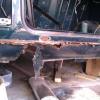Do not lubricate threads at all - In lubricating the threads, you will vastly reduce the friction between the bolt / nut and threaded material which can cause a number of problems! Firstly the lower thread friction can cause the joint to loosen due to the nut / bolt slipping especially in high vibration areas, especially if the lubricant has got onto the mating face of the nut / bolt and the component it is joining as this will also reduce the under head frictional force as well.
Also if the threads have been lubricated prior to assembly, the reduced friction from the thread (and possible from under head frictional loss) can also cause you to over tighten the joint, which can at least damage the components you are joining, but can more seriously potentially cause you to yeild the bolt (i.e. stretch the the bolt beyond its elastic limit) which will reduce the strength of the bolt leading to either a failure of the bolt whilst you are doing it up, or worse still cause the bolt to fail under load while you are moving, which could be very dangerous!
The best way to avoid corrosion within the bolt is to buy good quality fixings which have been given a corrosion preventative coating - this is what the major car manufacturers are doing. I speak from experience as I work in a major manufacturer's threaded joints cae analysis department!
Edited by TMW.Racing, 12 February 2015 - 10:09 PM.























